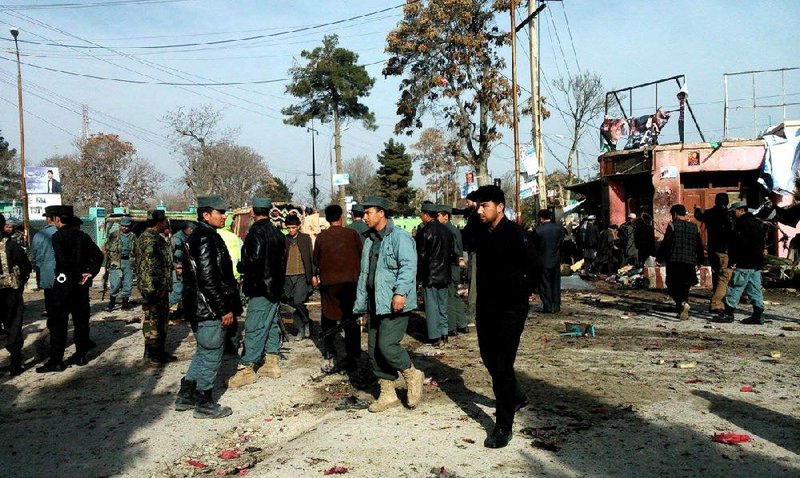KABUL, Afghanistan -- A suicide bomber riding a rickshaw blew himself up outside a checkpoint near a market in northern Afghanistan on Tuesday, killing at least 17 civilians, officials said, in the latest attack in the countdown to next month's presidential elections.
Nobody immediately claimed responsibility for the attack in the capital of Faryab province, but it happened in an area where the Taliban and allied militant groups are active. The Taliban have threatened a campaign of violence to disrupt the April 5 vote, which will choose a new president to lead the country as foreign troops prepare to end their combat mission by the end of the year.
The attacker was approaching the checkpoint, where cars were being searched on a road leading to the governor's compound in Maymana, when he detonated his explosives hidden in the rickshaw, the officials said.
However, most of the victims were vendors peddling fresh bread and other people at the busy roadside market area.
Provincial Gov. Mohammadullah Patash said 17 people were killed, including three children, and 26 were wounded in the explosion, which struck some 200 yards from the governor's compound.
Employees of the nearby Electricity Department also were among the casualties, said the deputy governor, Abdul Satar Barez.
"They killed innocent people in a place where locals were just trying to earn 10 Afghanis [about 20 cents] to buy a piece of bread. Most of the casualties were either selling bread or buying it," he said.
President Hamid Karzai also condemned Tuesday's attack, saying it only served the purpose of foreigners, which he said was to kill Muslims and create instability in Afghanistan.
The Taliban have staged numerous attacks in Faryab, which lies far from their traditional strongholds in southern and eastern Afghanistan. In October 2012, a suicide bomber struck a mosque packed with senior regional officials in Maymana, killing 41 people.
Afghan civilians are frequently caught up in the violence as insurgents battle Afghan and international troops in an effort to undermine the Western-backed government. The United Nations said 2,959 civilians were killed and 5,656 wounded last year, a 14 percent increase from the previous year.
The Taliban deny that they target civilians, but the U.N. report blamed 74 percent of all civilian casualties last year on insurgents.
The winner of the April 5 vote will replace Karzai, who is barred by the constitution from seeking a third term.
On Tuesday, Karzai nominated Mohammad Yunus Qanooni, a former interior minister, as his new first vice president. If approved by the parliament, Qanooni will replace Mohammed Qasim Fahim, who died March 9.
Qanooni, like his predecessor, is an ethnic Tajik who rose to prominence through the old Northern Alliance, a now defunct coalition of militias that resisted the Taliban's conquest of Afghanistan in the 1990s.
Fahim was among the most feared power brokers in northern Afghanistan before he died of a heart attack. Karzai and U.S. and European officials had been counting on Fahim to help avert a political crisis if a candidate from a larger ethnic group, the Pashtuns, wins the election.
Karzai, who is legally barred from running for a third term, decided to nominate Qanooni after consulting with politicians from northern Afghanistan, where Tajiks dominate, and other parts of the country, said Aimal Faizi, a spokesman for the president.
He also sought advice from "jihadi leaders," a term used in Afghanistan to describe the old guard of warlords and commanders who led the fight against the Soviet occupation of Afghanistan in the 1980s.
If the nomination is approved, Qanooni will be the third Tajik with roots in the old Northern Alliance to serve as the first vice president under Karzai, who is Pashtun.
Of the three leading contenders for the presidency, two are Pashtuns whose running mates are Tajik. The third, Abdullah Abdullah, the country's main opposition politician, is half Tajik and is closely associated with the Northern Alliance. His first running mate is a Pashtun.
Information for this article was contributed by Rahim Faiez of The Associated Press and by Matthew Rosenberg of The New York Times.
A Section on 03/19/2014
